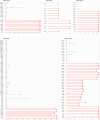Two-Period Study Results from a Large Italian Hospital Laboratory Attesting SARS-CoV-2 Variant PCR Assay Evolution
- PMID: 36409091
- PMCID: PMC9769628
- DOI: 10.1128/spectrum.02922-22
Two-Period Study Results from a Large Italian Hospital Laboratory Attesting SARS-CoV-2 Variant PCR Assay Evolution
Abstract
In keeping with the evolution of severe acute respiratory syndrome coronavirus 2 (SARS-CoV-2), the COVID-19 causative agent, PCR assays have been developed to rapidly detect SARS-CoV-2 variants, which have emerged since the first (Alpha) variant was identified. Based on specific assortment of SARS-CoV-2 spike-protein mutations (ΔH69/V70, E484K, N501Y, W152C, L452R, K417N, and K417T) among the major variants known to date, Seegene Allplex SARS-CoV-2 Variants I and Variants II assays have been available since a few months before the last (Omicron) variant became predominant. Using S gene next-generation sequencing (NGS) as the SARS-CoV-2 variant identification reference method, we assessed the results of SARS-CoV-2-positive nasopharyngeal swab samples from two testing periods, before (n = 288, using only Variants I) and after (n = 77, using both Variants I and Variants II) the appearance of Omicron. The Variants I assay allowed correct identification for Alpha (37/37), Beta/Gamma (28/30), or Delta (220/221) variant-positive samples. The combination of the Variants I and Variants II assays allowed correct identification for 61/77 Omicron variant-positive samples. While 16 samples had the K417N mutation undetected with the Variants II assay, 74/77 samples had both ΔH69/V70 and N501Y mutations detected with the Variants I assay. If considering only the results by the Variants I assay, 6 (2 Beta variant positive, 1 Delta variant positive, and 3 Omicron variant positive) of 365 samples tested in total provided incorrect identification. We showed that the Variants I assay alone might be more suitable than both the Variants I and Variants II assays to identify currently circulating SARS-CoV-2 variants. Inclusion of additional variant-specific mutations should be expected in the development of future assays. IMPORTANCE Omicron variants of SARS-CoV-2 pose more important public health concerns than the previously circulating Alpha or Delta variants, particularly regarding the efficacy of anti-SARS-CoV-2 vaccines and therapeutics. Precise identification of these variants highly requires performant PCR-based assays that allow us to reduce the reliance on NGS-based assays, which remain the reference method in this topic. While the current epidemiological SARS-CoV-2 pandemic context suggests that PCR assays such as the Seegene Variants II may be dispensable, we took advantage of NGS data obtained in this study to show that the array of SARS-CoV-2 spike protein mutations in the Seegene Variants II assay may be suboptimal. This reinforces the concept that initially developed PCR assays for SARS-CoV-2 variant detection could be no longer helpful if the SARS-CoV-2 pandemic evolves to newly emerging variants.
Keywords: PCR assay; SARS-CoV-2; amino acid mutation; next-generation sequencing; spike protein; variant detection.
Conflict of interest statement
The authors declare no conflict of interest.
Figures


Similar articles
-
Emerging Variants of SARS-CoV-2 and Novel Therapeutics Against Coronavirus (COVID-19).2023 May 8. In: StatPearls [Internet]. Treasure Island (FL): StatPearls Publishing; 2025 Jan–. 2023 May 8. In: StatPearls [Internet]. Treasure Island (FL): StatPearls Publishing; 2025 Jan–. PMID: 34033342 Free Books & Documents.
-
Emergency SARS-CoV-2 Variants of Concern: Novel Multiplex Real-Time RT-PCR Assay for Rapid Detection and Surveillance.Microbiol Spectr. 2022 Feb 23;10(1):e0251321. doi: 10.1128/spectrum.02513-21. Epub 2022 Feb 23. Microbiol Spectr. 2022. PMID: 35196812 Free PMC article.
-
Rapid Detection of the Omicron (B.1.1.529) SARS-CoV-2 Variant Using a COVID-19 Diagnostic PCR Assay.Microbiol Spectr. 2022 Aug 31;10(4):e0099022. doi: 10.1128/spectrum.00990-22. Epub 2022 Jul 5. Microbiol Spectr. 2022. PMID: 35863025 Free PMC article.
-
Structural impact of a new spike Y170W mutation detected in early emerging SARS-CoV-2 Omicron variants in France.Virus Res. 2024 May;343:199354. doi: 10.1016/j.virusres.2024.199354. Epub 2024 Mar 16. Virus Res. 2024. PMID: 38492859 Free PMC article. Review.
-
Molecular evolution of SARS-CoV-2 from December 2019 to August 2022.J Med Virol. 2023 Jan;95(1):e28366. doi: 10.1002/jmv.28366. J Med Virol. 2023. PMID: 36458547 Free PMC article. Review.
Cited by
-
Frequency of SARS-CoV-2 variants identified by real-time PCR in the AUNA healthcare network, Peru.Front Public Health. 2024 Feb 12;11:1244662. doi: 10.3389/fpubh.2023.1244662. eCollection 2023. Front Public Health. 2024. PMID: 38410127 Free PMC article.
-
Comparative evaluation of RT-PCR and antigen-based rapid diagnostic tests (Ag-RDTs) for SARS-CoV-2 detection: performance, variant specificity, and clinical implications.Microbiol Spectr. 2024 Jun 4;12(6):e0007324. doi: 10.1128/spectrum.00073-24. Epub 2024 Apr 29. Microbiol Spectr. 2024. PMID: 38683014 Free PMC article.
-
Development of primer-probe sets to rapidly distinguish single nucleotide polymorphisms in SARS-CoV-2 lineages.Front Cell Infect Microbiol. 2023 Dec 7;13:1283328. doi: 10.3389/fcimb.2023.1283328. eCollection 2023. Front Cell Infect Microbiol. 2023. PMID: 38130775 Free PMC article.
-
Molecular Epidemiology of SARS-CoV-2 within Accra Metropolis Postlockdown.Adv Virol. 2024 Mar 29;2024:2993144. doi: 10.1155/2024/2993144. eCollection 2024. Adv Virol. 2024. PMID: 38584794 Free PMC article.
References
Publication types
MeSH terms
Substances
Supplementary concepts
LinkOut - more resources
Full Text Sources
Medical
Miscellaneous

